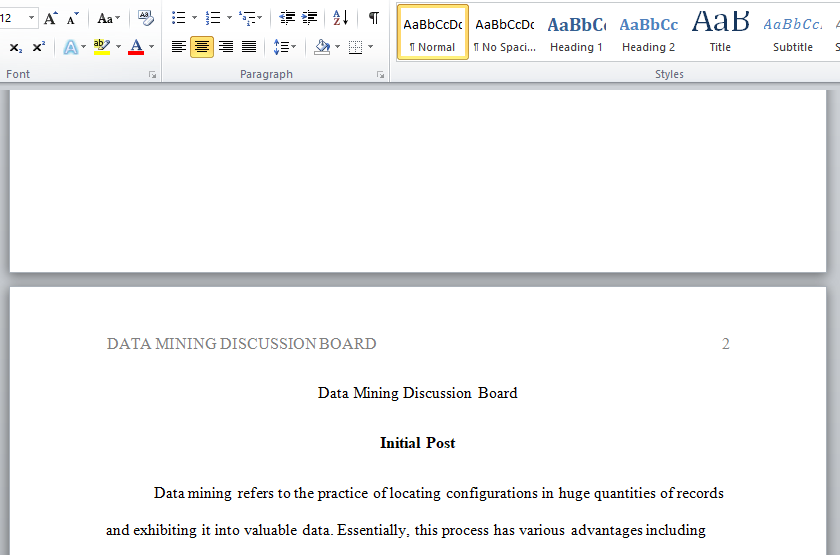What are some pros and cons to data mining?
What are some pros and cons to data mining? Provide an example of when data mining was used and the outcome provided an incorrect assumption or issue. How can these types of situations be avoided in the future?
reply to two peers:
Savanna Bullard posted Apr 1, 2020 5:21 PM
Data mining extracts knowledge and determines interesting and useful patterns. This information is used to improve different aspects of healthcare. Some pro’s of data mining are higher quality of care, early intervention, and fraud detection. Some con’s of data mining are privacy and replacing doctors.
A situation that I recently dealt with during my internship is we had a new administrator and he had to use data mining to find discrepancies in the allotted monthly budget for the facility. The facility was going over budget every month for the past few months under the old administrator. Using data mining he found a bunch of checks written out to the old administrator with no explanation as to why. So he had come to the conclusion that the money was being stolen from the company by the old administrator. This was wrong. The old administrator was writing checks to cover personal items for the residents from the stores but, he did not keep a receipt or put in a reason for writing the checks. This can be avoided in the future by having a policy in place stating that if checks are written there has to always be a reason along with an attached receipt. That way when data mining is being used on the budget it is seen that the extra money was spent on the residents and it won’t look like the money is being stolen.
ȚĂRANU, I. (2015). Data mining in healthcare: decision making and precision. Database Systems Journal, 6(4), 33-40.
Alva Alvarez Gonzalez posted Apr 1, 2020 12:06 PM
This page automatically marks posts as read as you scroll.
Adjust automatic marking as read setting
Data mining is the process of finding patterns in data sets to predict outcomes. In healthcare, laboratory tests are essential in assisting doctors to diagnose and treat a patient for underlining issues, that might otherwise be missed during a medical assessment. Doing so improves patient safety and outcomes, something hospital administration investigates to increase job performance and efficiencies. Cons of data mining in healthcare are a lack of privacy by accessing patient medical records or sensitive information. Although there are laws set in stone relating to the privacy of medical records, according to some laws this doesn’t always apply to data sharing (Singer, 2020).
The Department of Health and Human Services released a new system that would allow patients to manage their healthcare records through third-party apps. They stated patients will be able to access any third-party application they choose to connect to the application programming interface to integrate a health plan’s information to their electronic health record (The U.S. Department of Health and Human Services, 2020). Though this can become an issue in the future because it can heighten risks to patient privacy. I do not trust third-party apps and though this is great for patients to access their health care data this also means third parties acquiring patient information. Situations like this can be avoided if healthcare facilities would stop withholding patient’s information and charging them from trying to access it.
Singer, N. (2020, March 9). New Data Rules Could Empower Patients but Undermine Their Privacy. Retrieved from The New York Times: https://www.nytimes.
The U.S. Department of Health and Human Services. (2020, March 9). HHS Finalizes Historic Rules to Provide Patients More Control of Their Health Data. Retrieved from The U.S. Department of Health and Human Services: https://www.hhs.gov/

